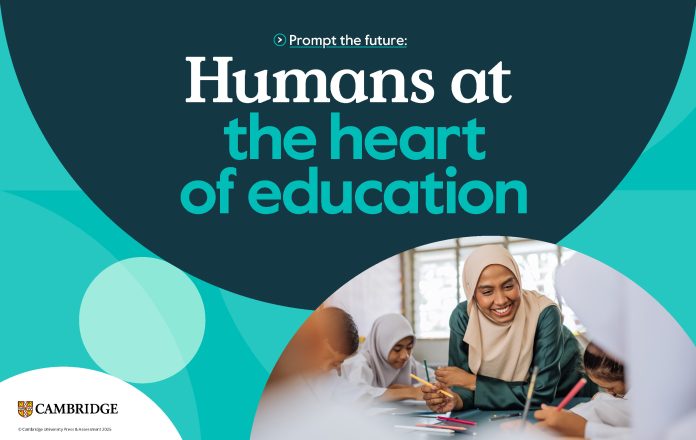New Cambridge University Press & Assessment (Cambridge) report focuses on the role of technology and human skills in the future of education.
Ghanashould put human skills, knowledge and values at the heart of education to prepare the next generation for the AI era, a new Cambridge University Press & Assessment (Cambridge)report has found.
While it is essential that Ghana’s education system prepares young people for new technology, this does not just entail teaching them digital skills, which can themselves easily become obsolete as the pace of technological change accelerates.The report finds that the greatest possibilities for education systems lie not in technology alone, but in what humans and technology can achieve together.
These are among the findings of ‘Humans at the heart of education’, the new report from Cambridge focused on national education system development.
The report calls on Ghana and education systems around the world to:
1) Focus on education that builds the whole person: If AI can replace us, then we are not teaching the right things. Education must go beyond traditional test scores to develop the knowledge, skills and values that drive economic growth, global engagement and flourishing societies.
2) Build change with people across the system: To get to the heart of education challenges, listen to the people at the heart of education. The best solutions emerge when governments, teachers, learners, families, employers and communities work together.
3) Equip teachers to be agents of change: Technology should empower teachers, not replace them. It should make their lives in the classroom easier and free up their time to focus on hard-to-teach human skills, like creativity and critical thinking.
Key recommendations for Ghana:
- Ghana should ensure education continues to be highly relevant to children’s local context because evidence shows that is how they learn best. National education strategies should ensure education remains aligned with national visions, and reflect national history, traditions, cultural values, social priorities and aspirations for the future. Taking a national approach gives learners a firm foundation to interpret issues clearly, build trust and contribute original perspectives. It also helps students form their sense of identity and understand their place in the world. Ghana is already making progress in this direction, with its new senior high school curriculum designed to instil Ghanaian values, culture, and morals.
- It is doubly important for Ghana to invest in education that is relevant to students’ context given the increasing adoption of AI with its inherent language biases. While only an estimated 5% of people speak English as a first language, 90% of several Large Language Models’ training data is in English.
- Teachers should never be replaced with technology. Nations that use technology as a substitute for teachers risk creating a two-tier system. One tier where children learn from skilled teachers using technology to enhance learning, and another where children rely on digital platforms with little or no human guidance.
- Instead, Ghana and other nations should empower teachers with technology. When used wisely, technology can reduce workload by automating marking, feedback and lesson planning. It can enable professional development with reflective tools, peer collaboration and access to expertise. It can support personalised learning, identify gaps, suggest interventions and provide detailed reports to inform teaching. And it can encourage innovation, allowing teachers to trial new methods and engage in research.
- Ghana should place teachers at the heart of reforms to make education more human-centred in the AI age. Policymakers must listen to what teachers say works, and where they need help. If education shifts towards human connection and skills like empathy, collaboration and critical thinking, the teacher’s role becomes even more vital. Teachers create spaces to foster “hard to learn” skills, adapt to local contexts, and become role models.
- Ghana should teach digital skills as an essential part of its curricula, with The World Economic Forum listing AI, big data, cybersecurity and technology literacy among the fastest-growing skills employers globally look for. But technology changes too fast for one-time learning, so it is vital to focus on building digital competence for life. This is less about how to use specific technologies and more about building wider knowledge and skills to help learners use those tools wisely.
- Ghana’s education system should focus on building skills and knowledge side by side to give learners the tools to sharpen their judgements and build a society where AI might guide thinking, but people are responsible for the outcome. With easy access to data through AI, education policymakers should avoid the temptation to focus on building skills and let technology supply knowledge.
- While the focus on addressing the teacher shortage is important to close learning gaps, Ghana should also prioritise strengthening teaching quality, which can be equally important. Where teachers lack the training, support and conditions they need to thrive, it limits the impact they can have on learning outcomes.Ghana has already introduced Professional Learning Communities in secondary schools, aiming to meet weekly, to improve teachers’ skills.
- Ghana should ensure the curriculum is flexible enough that it gives teachers the space they need to use their judgement and creativity to create lessons that keep students engaged and interested.
Jane Mann, Managing Director, Partnership for Education, Cambridge said:
“AI is changing education, and the world students will graduate into, at a faster pace than any time in human history.
“But teaching digital skills is just the start. Our report shows that for Ghana’s next generation to thrive, we must also equip learners with the deeply human knowledge, skills, values and connections that are key to building resilient individuals, and in turn resilient economies and societies.
“This includes ensuring education remains highly local to students’ context in Ghana, and putting teachers and school leaders at the heart of education reforms. The pace of technology means we don’t know exactly what tomorrow’s world of work looks like for today’s students, but by keeping humans at the heart of education, we prepare Ghana’s next generation for all eventualities.”
About Cambridge University Press & Assessment
Cambridge University Press & Assessment is a world leader in assessment, education, research and academic publishing. We are part of the University of Cambridge and share its mission ‘to contribute to society through the pursuit of education, learning and research at the highest international levels of excellence’. This connection gives us an unrivalled depth of experience in research, academic publishing, national education systems, international education and English language learning.








